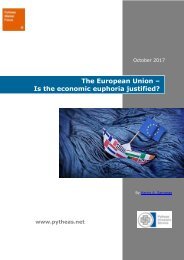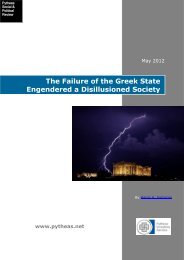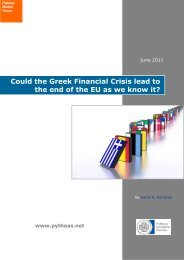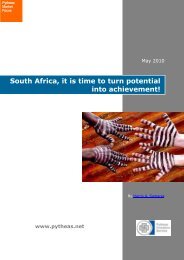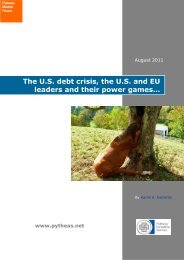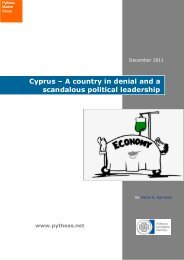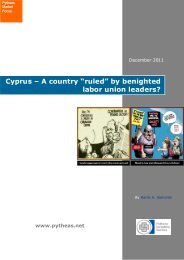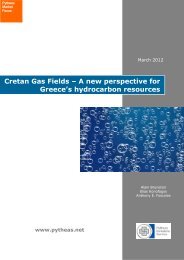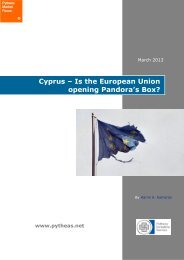Cyprus – Finally energy security for the EU in the pipeline?
The vulnerability of the EU to energy supply risks is a fact but this can be no more. If the most conservative data is taken into account in regard to the natural gas reserves discovered in the exclusive economic zone (EEZ) of Cyprus (and the Levantin Basin), for the first time ever in European energy history, the EU is guaranteed an uninterrupted supply of a traditional energy source. What if a JV is structured with the EU? What if Cyprus and the EU set up a company together for the exploitation of the hydrocarbons in the Levantin Basin along with the participation of Israel, Lebanon, Egypt and Syria? Such a venture will minimize both sovereign and financial risks for all parties involved. It will secure both the source and the transit route that…
The vulnerability of the EU to energy supply risks is a fact but this can be no more. If the most conservative data is taken into account in regard to the natural gas reserves discovered in the exclusive economic zone (EEZ) of Cyprus (and the Levantin Basin), for the first time ever in European energy history, the EU is guaranteed an uninterrupted supply of a traditional energy source.
What if a JV is structured with the EU? What if Cyprus and the EU set up a company together for the exploitation of the hydrocarbons in the Levantin Basin along with the participation of Israel, Lebanon, Egypt and Syria? Such a venture will minimize both sovereign and financial risks for all parties involved. It will secure both the source and the transit route that…
Create successful ePaper yourself
Turn your PDF publications into a flip-book with our unique Google optimized e-Paper software.
Py<strong>the</strong>as<br />
Market<br />
Focus<br />
Natural Gas consumption is projected to double worldwide by 2030 due to expected growth <strong>in</strong><br />
<strong>energy</strong> demand. Many European countries rely on a limited number of <strong>energy</strong> supply sources<br />
and such reliance creates serious issues of <strong>security</strong> of supply. The vulnerability of <strong>the</strong> <strong>EU</strong> to<br />
<strong>energy</strong> supply risks is a fact but this can be no more. If <strong>the</strong> most conservative data is taken<br />
<strong>in</strong>to account <strong>in</strong> regard to <strong>the</strong> natural gas reserves discovered <strong>in</strong> <strong>the</strong> exclusive economic zone<br />
(EEZ) of <strong>Cyprus</strong> (and <strong>the</strong> Levant<strong>in</strong> Bas<strong>in</strong>), <strong>for</strong> <strong>the</strong> first time ever <strong>in</strong> European <strong>energy</strong> history,<br />
<strong>the</strong> <strong>EU</strong> is guaranteed an un<strong>in</strong>terrupted supply of a traditional <strong>energy</strong> source.<br />
Estimates of reserves <strong>in</strong> <strong>the</strong> two primary fields<br />
<strong>in</strong> <strong>the</strong> Levant<strong>in</strong> Bas<strong>in</strong> are believed to be <strong>in</strong> <strong>the</strong><br />
region of 24.5 trillion cubic feet (Leviathan<br />
16tcf and Tamar 8.5tcf; seismic evidence of<br />
<strong>the</strong> Cypriot block Aphrodite (parcel 12)<br />
currently be<strong>in</strong>g drilled by Houston’s Noble<br />
Energy, is estimated to be about 50% richer<br />
than Israel’s Leviathan field.<br />
If <strong>the</strong> f<strong>in</strong>d<strong>in</strong>g confirms <strong>the</strong> estimates, <strong>in</strong>clud<strong>in</strong>g<br />
those of Israel <strong>in</strong> <strong>the</strong> Leviathan region, will<br />
rank among <strong>the</strong> largest <strong>in</strong> <strong>the</strong> world <strong>in</strong> <strong>the</strong> last<br />
10 years. The amount of gas estimated from<br />
<strong>the</strong>se two parcels alone is equal to half of <strong>the</strong><br />
known reserves of those <strong>the</strong> United States; a<br />
country with a population of 310 million,<br />
whereas <strong>the</strong> total population of <strong>the</strong> <strong>Cyprus</strong>,<br />
Israel and Lebanon claim<strong>in</strong>g ownership rights<br />
to <strong>the</strong> two ma<strong>in</strong> parcels <strong>in</strong> <strong>the</strong> Levant<strong>in</strong> Bas<strong>in</strong><br />
is less than 13 million. It is important to note that <strong>the</strong> U.S. Geological Survey estimates that<br />
<strong>the</strong> Levant<strong>in</strong>e Bas<strong>in</strong> holds an estimated 1.7 billion barrels of oil and a mean of 122 trillion<br />
cubic feet of recoverable natural gas reserves <strong>–</strong> <strong>the</strong> worldwide proven reserves of<br />
conventional gas alone total 187.49 trillion m³ with a reserve production ratio of more than<br />
60 years.<br />
The <strong>Cyprus</strong> government, Noble Energy as well, seems to be oriented towards <strong>the</strong> construction<br />
of an onshore natural gas liquefaction plant, <strong>in</strong>tended to process and export LNG <strong>in</strong>stead of a<br />
pipel<strong>in</strong>e. Accord<strong>in</strong>g to Noble Energy, <strong>the</strong> LNG plant is more flexible <strong>in</strong> terms of sell<strong>in</strong>g natural<br />
gas to <strong>the</strong> highest price bidder than be<strong>in</strong>g stuck to a s<strong>in</strong>gle or few buyers at <strong>the</strong> end of <strong>the</strong><br />
pipel<strong>in</strong>e.<br />
Complex challenges lie ahead: Is <strong>the</strong> <strong>in</strong>stallation of <strong>the</strong> pipel<strong>in</strong>e from <strong>Cyprus</strong> to<br />
ma<strong>in</strong>land Europe feasible, or <strong>the</strong> water depth and <strong>the</strong> underwater terra<strong>in</strong> <strong>for</strong>bid<br />
such a task? If a pipel<strong>in</strong>e is a no go, does this mean that <strong>the</strong> transportation of gas<br />
will have to employ conversion <strong>in</strong>to liquid natural gas (LNG) and, <strong>in</strong> early time,<br />
perhaps compressed natural gas (CNG) transportation? Does <strong>Cyprus</strong> pipes <strong>the</strong> gas<br />
or stores it <strong>for</strong> export? Isn’t a liquefaction plant too expensive an option? Is <strong>Cyprus</strong><br />
able to undertake such an expensive task, especially if <strong>the</strong> LNG route is followed?<br />
Will <strong>the</strong> countries <strong>in</strong> <strong>the</strong> Levant Bas<strong>in</strong>, such are Israel and Lebanon, manage to put<br />
aside <strong>the</strong>ir differences and cooperate <strong>for</strong> <strong>the</strong> real benefit of <strong>the</strong>ir people or would<br />
this be <strong>the</strong> cause of more tension? Is a pipel<strong>in</strong>e runn<strong>in</strong>g from <strong>Cyprus</strong> gas fields to<br />
onto Turkey and <strong>the</strong>n to <strong>the</strong> proposed Nabucco conveyor a wise decision? Is giv<strong>in</strong>g<br />
Russia gas concessions <strong>for</strong> <strong>Cyprus</strong> and <strong>the</strong> <strong>EU</strong> a wise decision?<br />
The natural gas discovered <strong>in</strong> <strong>Cyprus</strong> is not just a <strong>Cyprus</strong> issue; it is an issue of primary<br />
importance <strong>for</strong> <strong>the</strong> whole of <strong>the</strong> European Union that should be tackled jo<strong>in</strong>tly by both <strong>Cyprus</strong><br />
and <strong>the</strong> <strong>EU</strong>. For <strong>the</strong> first time ever <strong>the</strong> <strong>EU</strong> is given <strong>the</strong> opportunity to avoid dependence of<br />
<strong>energy</strong> supply on politically and economically volatile countries and regions such are Ukra<strong>in</strong>e,<br />
Turkey, Eurasia and <strong>the</strong> Middle East!<br />
<strong>Cyprus</strong>, Israel and <strong>the</strong> <strong>EU</strong> (with <strong>the</strong> lead coord<strong>in</strong>ation of <strong>the</strong> <strong>EU</strong> and <strong>Cyprus</strong>) but also Lebanon,<br />
Syria and Egypt should jo<strong>in</strong>tly work toge<strong>the</strong>r to ensure that an appropriate framework and<br />
Copyright © 2011 Py<strong>the</strong>as Limited 04 November 2011 2



